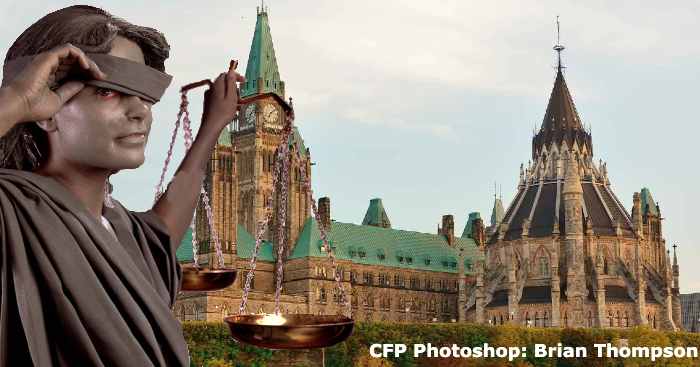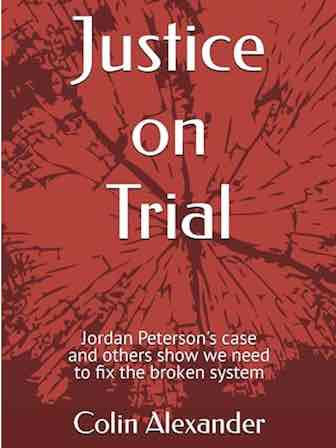By Colin Alexander ——Bio and Archives--December 19, 2023
Canadian News, Politics | CFP Comments | Reader Friendly | Subscribe | Email Us

Government in Canada is broken: education, health care, the military, Indigenous affairs, immigration and housing, and Parliament itself. The Senate’s where stooges retire on rocking-chair money. Against this background, a necessity for a free and democratic society should be a trustworthy justice system. But it too is broken. It’s dominated by the vested interests of crony capitalism and woke inanity. That’s the thrust of my recently published book Justice on Trial: Jordan Peterson’s case and others show we need to fix the broken system.

As demonstrated by the Truckers’ Convoyin the winter of 2022, there’s no vestige of capacity for handling a large and lawful protest competently. After the event it took 18 months to bring to court the organizers on picayune charges of mischief. Now the arguably incompetent Justice Heather Perkins-McVey is stringing out the trial for further months and months. There’s all the capacity in the world to make a big deal out of the confrontation that Prime Minister Justin Trudeau induced as his personal vanity project. But as related by John Carpay, president of the Justice System for Constitutional Freedoms, in Ontario alone hundreds of serious charges are thrown out because of delays because prosecutors are overloaded. Ontarians walk away from charges of rape, arson, murder and violent assault—all because the process exceeds the time limit for prosecution. Despite having photographs of the perpetrators, police in Winnipeg didn’t charge thosewho tore down statues of Queen Victoria and our beloved Queen Elizabeth.
A free press should be the last bulwark against incompetence and corruption in government. But here too Canada is broken. Overbearing government buys off the mainstream media and does what it can to suppress increasingly vibrant alternatives. It seems, however, that even independent media are afraid to confront head-on the structural failings of the justice system, let alone to advocate for its remediation.

A recent case demonstrates the problem. In Federal Court, Rebel News contested, unsuccessfully, a fine of $3,000 imposed by bureaucrats for contravening the Elections Act. In the 23,000 lugubrious words of her decision, Justice Cecily Strickland carried forward the proposition that unelected bureaucrats can to defer to the vested interests as long as doing that can somehow be designated reasonable. But judges determine reasonableness for themselves! Justice Strickland quoted from the latest in a long line of wretched decisions from the Supreme Court on administrative law, in Vavilov: “When a court reviews the merits of an administrative decision there is a presumption that the standard of review is reasonableness\...” The contradiction here is that judges are presumed to have the capacity both for determining reasonableness as well as unreasonableness so blatant that even they can’t let it stand.
At issue was whether it was lawful to publicize a book critical of Prime Minister Trudeau and his government by way of lawn signs during the 2019 federal election. Canada’s not alone among Anglo-American governments in restricting partisan advertising during an election. But the issue before the court should have been whether promotion of the book The Libranos during that election campaign violated what the Elections Act actually says:
Support Canada Free Press

The law is then that publishing pretty much any editorial comment is allowable during an election campaign. So what’s special about wrapping it all up in a book? Nothing! The Elections people acknowledged that the book comprised lawful comment. They also acknowledged that Rebel News made books available to the public only by selling them for their regular price.
So what about the timing of the book’s publication? Every informed Canadian knows that author Ezra Levant and Rebel News have long been viscerally opposed to Trudeau and his government, and they’ve also published a succession of critical books at various times unrelated to elections. While Levant admitted that publication of his book after the election would have missed his objective, its timing begs the question unaddressed by Justice Strickland: How long before an election campaign must a book launch occur for it to fall outside the purview of the Elections Act?
And what about promotion of the book? Why did Justice Strickland accept this? “Further, that the [Elections] Commissioner reasonably concluded, based on the evidence and submissions before him, that the lawn signs constituted “election advertising” defined under s 2(1) of the Act and that the clarification found in Paragraph 2(1)(b) … did not apply.”
Who in blazes says legislated clarification of the legislation does not apply? Why would Justice Strickland set aside the exemption in the legislation under law as it really is? Logically, the difference between promoting a book by way of lawn signs as compared with placing an advertisement in, say, Quill & Quire is a difference without a material distinction. It’s a difference in degree, not a difference in kind. To be clear, the lawn signs were not promoting any individual candidate, let alone the political parity, which then would have brought them within the purview of the Elections Act.
Justice Strickland’s decision constitutes yet another violation of the legitimate rights of law-abiding Canadians. The many Canadians who fled communism will understand where Canada’s justice system is taking us. See what has happened before, in the great movie about justice in Hitler’s Germany, Judgment at Nuremberg. And buy my book!
Colin Alexander’s recently published book is Justice on Trial: Jordan Peterson’s case and others show we need to fix the broken system
View Comments
Colin Alexander was publisher of the Yellowknife News of the North. His forthcoming book, to be published soon by Frontier Centre for Public Policy, is Justice on Trial: Truckers Freedom Convoy and other problematic cases.